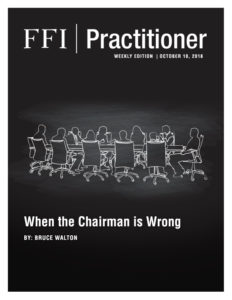
View this edition in our enhanced digital edition format with supporting visual insight and information.
As an adviser, what can you do when the owner/CEO who hires you is wrong? According to Bruce Walton in this week’s edition, an objective board of directors can serve as a valuable ally to confront a misguided CEO and to get the company moving in the right direction. To illustrate his point, Bruce shares some anecdotes of how a board can help in these tricky situations.
Many small mid-cap family business owners feel a board may inhibit their freedom of action or make them uncomfortable by holding them accountable. But what about when the chairman/owner/CEO is wrong, or his or her judgment should be questioned? Although advisers may have been hired by the owner, many take a holistic view of the client and may not be easily positioned to challenge decisions being made by ownership. In these instances, a board can be an important ally to the adviser in helping the company move onto the right track.
Here are some issues and anecdotes, both positive and negative, that support the value of having an active and not overly deferential outside board, be it advisory or fiduciary. Perhaps you have seen similar situations in your advising, consulting, or research experience.
Emotional Issues
Owner/CEOs are often not aware of the emotions that regularly find their way into business decisions. Senior and middle managers may identify these situations but often cannot deal with them. Some examples:
- Objective Performance Appraisals
One owner/CEO had two sets of rules/expectations — one for family members and one for everyone else. Boards can implement objective performance appraisal systems that focus the company’s efforts on results, rewards, and consequences. In the design and implementation, the board must include all employed family members, treating everyone fairly. This is hard for management to do alone and can even be career threatening. The board can protect management where needed. - Succession: When is it time to go?
Management usually knows when the owner/CEO has lost his or her fast ball and is hurting the business. How does management tell the owner? The adviser probably cannot successfully do it on his or her own either. It should be through the clear-eyed board that has the courage to guide the owner to the right decision. - Succession: Is the heir-apparent qualified and prepared?
Dad prepared Junior in his own image, but the world changed, calling for a different set of skills. The board carefully evaluated the situation and gave the message to Dad that Junior wasn’t what the business now required going forward, thus protecting the family asset.
Blind Spots
Even the best CEOs develop blind spots. For instance:
- It Is Hard to Give Up Toys When the Business Hits a Rough Patch
- One owner/CEO had a plane, but when business got tough, he did not want to give it up. The board encouraged him to ground it and negotiated incentives to improve the business so he could get it back. The board acted as a non-emotional questioner in a way management or advisers could not.
- Another owner/CEO measured self-worth by having an operation in Canada, proudly describing the business as a “North American company,” but Canada consistently lost money. The board emphasized profitability as the proper driver, and he closed the unit.
- Compensating Employees Fairly
The board pressed the owner/CEO of a $70m business to convert from a totally discretionary bonus to a more formalized one that was largely based on KPIs. This led to greater perceived fairness in how senior managers were treated and rewarded. - Personal or Family Relationships with Customers
It is hard for family members to say “no” to long-standing customers who are also friends. Without oversight, “overly familiar” customers can produce less than profitable outcomes. The board can provide an objective voice and insist on both customer profitability analysis and a degree of separation between the business and the customer.
Attracting and Retaining Talent
As an executive recruiter, my focus is always on this issue. For example:
- LTIPs are Essential at High Levels
The board stood up to the $75m company non-executive chairman, who had had bad experiences with company bonuses (demanded but unearned), to provide market level short term and long-term incentives (LTIPs) to an incoming non-family CEO. The company had been unprofitable for a few years, but the new CEO turned a profit in nine months and doubled the ESOP in three years. Without a reasonable LTIP, they would have never landed the successful candidate who turned it around. - Keep Your Promises
The 80-year-old founder/chairman of a $20m manufacturing company hired a competent COO (with a promise to become CEO within six months) from a blue-chip industrial company. The mission was to double the company’s revenues, then sell. Yet the chairman wouldn’t stop meddling with things, nor would he authorize any growth investments. The board allowed this behavior without protest. They hired a VP of product development, but he soon left because of the chairman’s behavior. When the COO formally complained to the board, it triggered a discussion that led to the son taking over as CEO. Unfortunately, the son took on the father’s behavior, and the COO left, too. The net outcome was the company was still at $20m eight years later, when the COO felt it could easily have become a $50m company. - LTIPs Drive Growth
A $600m founder-managed company lost multiple CFOs in part because of a lack of LTIP. The founder/CEO was finally convinced to add one, and the board readily agreed, helping them grow to over $2b. - Strategy is Important
A family-controlled conglomerate that grew “haphazardly” to 20+ divisions was turned down by multiple well-qualified CEOs in a succession search because the candidates would not work for a board that had allowed such a lack of strategy. The board was too deferential to the chairman.
In summary, an active outside board has practical value to ownership and can be a strong ally to a family business adviser. The board can really help everyone stay out of the ditch.
About the contributor
 Bruce H. Walton is a partner in the Boston office of Battalia Winston. A co-leader of the Family-Owned Business Practice, he has more than 30 years of executive search experience and primarily recruits CEOs and their direct reports. Bruce can be reached at bwalton@battaliawinston.com.
Bruce H. Walton is a partner in the Boston office of Battalia Winston. A co-leader of the Family-Owned Business Practice, he has more than 30 years of executive search experience and primarily recruits CEOs and their direct reports. Bruce can be reached at bwalton@battaliawinston.com.
About Battalia Winston
Battalia Winston is an executive search firm that has been helping companies—from early stage to Fortune 500 companies—find and retain top executives for more than 50 years.

View this edition in our enhanced digital edition format with supporting visual insight and information.





